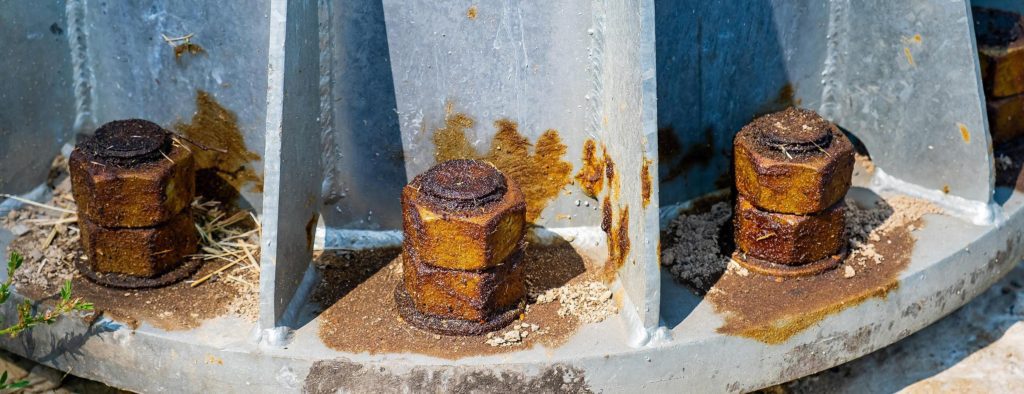When people discuss air pollution and the effects it has on our society, the conversation usually centers around the sources of the pollutants and the negative health effects they can have on people, such as the development of cancer.
One factor that is often overlooked and under-examined is that air pollution can have a corrosive effect on man-made structures, monuments, and public infrastructures such as bridges and highways. It can even affect the everyday lives of the average citizen in the form of degrading the exterior of your homes, motor vehicles, outside patio furniture, and barbecue grills.
What is Corrosion?
By definition, Corrosion is a natural process that converts a refined metal into a more chemically stable form such as oxide, hydroxide, or sulfide. It is the gradual destruction of materials by chemical and/or electrochemical reactions with their environment, and in our case, the reaction of these materials to pollutant and particulate matter in the air.
The most common materials that face corrosion in our daily life are metals and stone, materials that make up most buildings and public infrastructures. Airborne contaminants such as particulate matter are created because of the chemical reactions between liquids and solids. These same liquids and solids, including salt and black carbon, can interact with the molecules within metals and accelerate decay.
The Effects of Corrosion
As mentioned above, corrosion can have negative effects on people as well as commercial industries. Car owners might find the paint on their car wearing down faster in highly polluted areas as well as reduced performance of their vehicle. Homeowners have to fear anything kept outside on a patio or backyard for the constant exposure to airborne pollutants. Bigger problems have the potential to arise for public works and services too.
Corrosion can cause damage to bridge supports which could lead to bridge failure, endangering any and all who travel across them. Oil pipelines that are exposed to corrosion can have highly detrimental effects on the environment if they rupture. Commercial airplanes are at risk of the technical equipment wearing down to unsafe levels if exposed to corrosion, and I don’t have to tell you what kind of problems might occur from a malfunctioning airplane.
Corrosion caused by air pollutants are like the greek mythological hydra – if you cut off one head, two more grow in its place. In other words, corrosion to materials made of iron release harmful pollutants that then further contaminate the air, continuing and increasing the cycle.
How to Prevent Corrosion in the Workplace
When protecting high-grade, industrial equipment, there are preventative measures you can take to protect your property. First and foremost, invest in a high-efficiency air filtration system and a quality commercial air filter, such as the EFS High Efficiency V-Bank Filters.
Next, treat metal surfaces with protectants in order reduce the effect of corrosion from airborne pollutants. Lastly, if it’s possible to do so, you can galvanize your metal items, which in layman’s terms is to cover the product in zinc, a material that is highly resistant to corrosion.
Marine Environments
A unique area of concern when it comes to corrosion is that of marine environments. By that we mean an area that is exposed to the sea and marine life, essentially ships near the water. If your business is close to the ocean there are extra considerations when choosing the proper HVAC system and commercial air filter.
While there may be a bit of relief from industrial pollutants due to the cleansing nature of the ocean, there are other factors to consider such as extreme weather conditions like strong winds and salt water air sprays. These two factors alone can greatly speed up the corrosion process. These wet environments pose extra problems for filtration such as airborne bacteria, yeast, molds, and gasses.
If you work near this type of environment, consider air filters that are washable and do not have a porous surface. These types of filters do not encourage the growth of mold, bacteria, or fungi.
Preparing for Corrosion Control
If you are selecting an air filters for your industrial needs, there are several factors to consider before making your purchase. A rule of thumb for selecting HVAC systems: leave it to the experts and don’t trust a flashy brochure. Efficacy rates are largely exaggerated or measured by standards that are not relevant to your specific environment. This is especially true when trying to filter out gasses.
As for testing procedures to be done by your HVAC provider in order to assess your company’s specific needs. The best type of systems are “multi-pass systems” as they are much more efficient than a “single-pass” system. Your individual needs will determine whether you can incorporate a filtration system into your current ventilation or if you’ll need a standalone system. Don’t fret if you cannot incorporate into your current ventilation as standalone systems are often more effective as they are designed explicitly for your business needs.
Filters that Fight Corrosion
At Engineered Filtration Systems, we have designed filters for single and multi-pass systems that are extremely efficient at removing airborne pollutants and gas at high air flows. Our Gas Phase Filters are first in class at removing harmful gases from the air and have the added benefit of also removing unwanted odors from the environment. These filters can help protect sensitive industrial equipment, products, and procedures. These EFS filters are carbon loaded and made of a non-woven synthetic media with a unique blend of activated carbon inside.
They are excellent for use in state-of-the-art indoor climate control systems such as those in hospitals, airports, hospitals, museums, laboratories and other commercial buildings. If gases are not your main concern, turn to the V4-Bank filters that are built to withstand high velocities and turbulence while serving as an all-around air filter. These rigid-frame, constructed filters are universal to most HVAC systems and will provide a longer lifespan without sacrificing performance.
Call EFS for a free on-site consultation at 800 796-4337.

